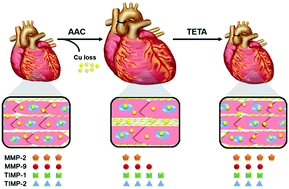当前位置:
X-MOL 学术
›
Metallomics
›
论文详情
Our official English website, www.x-mol.net, welcomes your feedback! (Note: you will need to create a separate account there.)
Copper-induced reduction in myocardial fibrosis is associated with increased matrix metalloproteins in a rat model of cardiac hypertrophy.
Metallomics ( IF 3.4 ) Pub Date : 2017-12-12 00:00:00 , DOI: 10.1039/c7mt00165g Yinjie Liu 1 , Ying Xiao , Jiaming Liu , Li Feng , Y James Kang
Metallomics ( IF 3.4 ) Pub Date : 2017-12-12 00:00:00 , DOI: 10.1039/c7mt00165g Yinjie Liu 1 , Ying Xiao , Jiaming Liu , Li Feng , Y James Kang
Affiliation

|
Trientine (TETA), a copper (Cu) chelator, is capable of replenishing Cu in the heart, and Cu repletion reduces cardiac fibrosis in a rodent model of cardiac hypertrophy. This study was undertaken to explore possible mechanisms by which Cu repletion diminishes cardiac fibrosis. Adult male Sprague-Dawley rats were subjected to ascending aortic constriction to induce cardiac hypertrophy. Four months after the operation, cardiac hypertrophy along with fibrosis was fully developed. TETA treatment was then followed at a dose of 21.9 mg kg−1, twice a day, administered orally for six weeks. At the end of the treatment, the hearts were harvested and all of the tissue samples were subjected to qRT-PCR, western blot, Sirius red staining, hydroxyproline assay, and immunostaining analyses. TETA treatment significantly increased the content of Cu in the hypertrophied myocardium, decreased type III collagen deposition and reduced cardiac fibrosis. On the other hand, this treatment did not alter the increase in fibroblasts induced by pressure overload, but significantly increased matrix metalloproteinase-2 (MMP-2), which is the enzyme mainly responsible for degradation of collagens in the heart. In addition, the mRNA and protein levels of tissue inhibitors of matrix metalloproteinase-1 and -2 (TIMP-1 and TIMP-2) were both remarkably increased in the hypertrophic myocardium, and normalized after TETA treatment. The data thus demonstrated that the reduction in cardiac fibrosis by TETA-induced Cu repletion is associated at least in part with an enhanced MMP-2 activity, leading to collagen degradation.
中文翻译:

在心肌肥大的大鼠模型中,铜诱导的心肌纤维化减少与基质金属蛋白增加有关。
Trientine(TETA)是一种铜(Cu)螯合剂,能够补充心脏中的Cu,并且在心脏肥大的啮齿动物模型中,补充Cu可以减少心脏纤维化。进行这项研究以探索铜补充减少心脏纤维化的可能机制。成年雄性Sprague-Dawley大鼠经历升主动脉缩窄以诱发心脏肥大。术后四个月,心脏肥大和纤维化充分发展。然后以21.9 mg kg -1的剂量进行TETA治疗,每天两次,口服六周。在治疗结束时,收获心脏,并对所有组织样品进行qRT-PCR,western印迹,Sirius红染色,羟脯氨酸测定和免疫染色分析。TETA治疗可显着增加肥大心肌中的Cu含量,减少III型胶原蛋白沉积并减少心脏纤维化。另一方面,这种治疗并没有改变压力超负荷引起的成纤维细胞增加,而是显着增加了基质金属蛋白酶2(MMP-2),基质金属蛋白酶2是主要负责心脏胶原蛋白降解的酶。此外,肥厚型心肌组织中基质金属蛋白酶-1和-2(TIMP-1和TIMP-2)的组织抑制剂的mRNA和蛋白质水平均显着升高,并在TETA治疗后归一化。因此,数据表明,TETA诱导的铜补充所致的心脏纤维化的减少至少部分与增强的MMP-2活性有关,从而导致胶原蛋白降解。
更新日期:2017-12-12
中文翻译:

在心肌肥大的大鼠模型中,铜诱导的心肌纤维化减少与基质金属蛋白增加有关。
Trientine(TETA)是一种铜(Cu)螯合剂,能够补充心脏中的Cu,并且在心脏肥大的啮齿动物模型中,补充Cu可以减少心脏纤维化。进行这项研究以探索铜补充减少心脏纤维化的可能机制。成年雄性Sprague-Dawley大鼠经历升主动脉缩窄以诱发心脏肥大。术后四个月,心脏肥大和纤维化充分发展。然后以21.9 mg kg -1的剂量进行TETA治疗,每天两次,口服六周。在治疗结束时,收获心脏,并对所有组织样品进行qRT-PCR,western印迹,Sirius红染色,羟脯氨酸测定和免疫染色分析。TETA治疗可显着增加肥大心肌中的Cu含量,减少III型胶原蛋白沉积并减少心脏纤维化。另一方面,这种治疗并没有改变压力超负荷引起的成纤维细胞增加,而是显着增加了基质金属蛋白酶2(MMP-2),基质金属蛋白酶2是主要负责心脏胶原蛋白降解的酶。此外,肥厚型心肌组织中基质金属蛋白酶-1和-2(TIMP-1和TIMP-2)的组织抑制剂的mRNA和蛋白质水平均显着升高,并在TETA治疗后归一化。因此,数据表明,TETA诱导的铜补充所致的心脏纤维化的减少至少部分与增强的MMP-2活性有关,从而导致胶原蛋白降解。


























 京公网安备 11010802027423号
京公网安备 11010802027423号